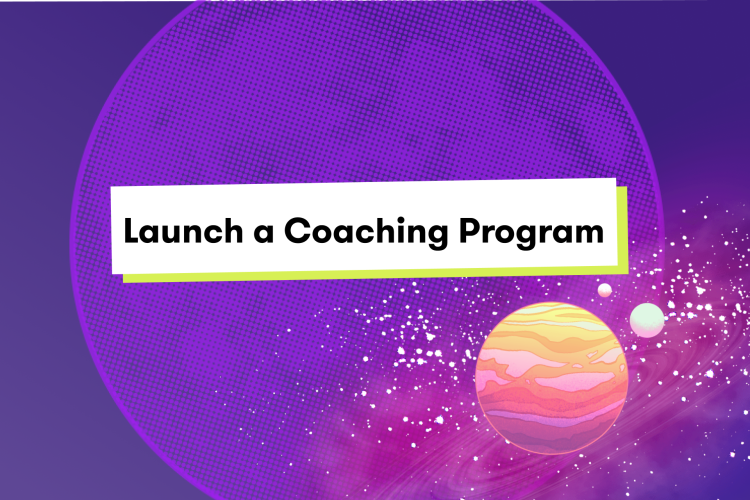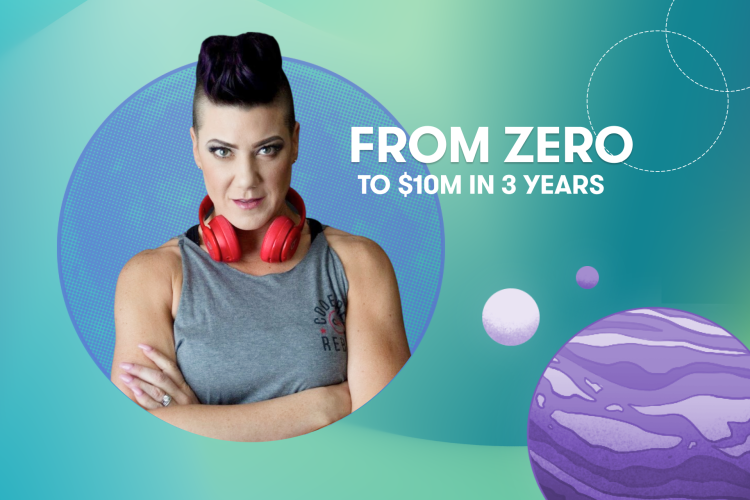Coaching
How to Start an Online Coaching Business in 2025 (8 Steps)
If you’re looking to level up your coaching, this guide will help you set up an online coaching business.
Author
Mighty Team
Last Updated
November 26, 2025

Coaches are thriving.
The International Coaching Federation estimated that the coaching industry grew by $20 billion USD and increased by 54% between 2019 and 2022.
So if you're looking to earn 6- or even 7- figures by helping people transform their lives, that's a fantastic calling. And the time is now.
In this article, we're going to give you everything you need to know about starting a coaching business. This includes:
Validating an offer and finding your ideal clients
Choosing a profitable coaching business model
Launching and scaling a thriving coaching business
If you’re interested in learning how to start an online coaching business, but unsure where to start, this guide will walk you through what you need to know.
Try the platform with the most $1 million communities.
What is online coaching?
Online coaching is when a coach offers transformative products and services over the internet--almost always including some type of virtual meeting with clients. This can be done through video or audio calls, or even messaging.
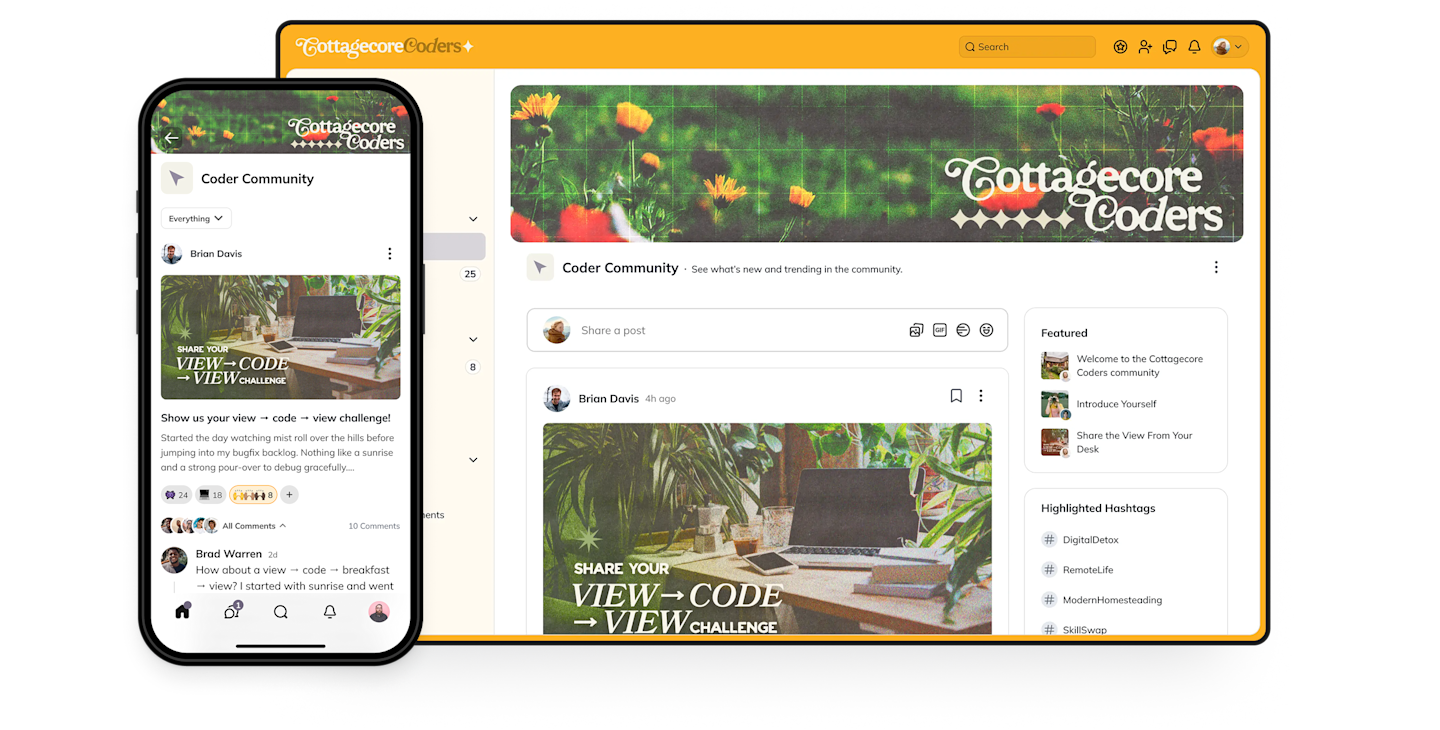
Here are some of the benefits of online coaching:
Coaches can attract more clients because they aren’t limited to being in the same town/city.
Coaches can provide their services from anywhere — from the comfort of their home to a coffee shop.
A coaching niche can be more viable if you're pulling from a bigger pool (e.g. you might not have enough people in your town to fit your niche).
Having more niched and specialized services can create a more profitable coaching business.
There’s minimal investment — coaches only need good WiFi and a reliable device.
Coaches can integrate additional content into their service by using a purpose-built coaching platform.
Coaches can scale the value and services they bring their clients--including different delivery forms like productized services or group coaching.
Try our coaching business name generator!
What makes a successful coaching business?
A niche: Generalist coaches can build businesses, but one of the quickest routes to success is to choose an in-demand niche and master it.
Expertise: This can mean different things, but a good coach does need some level of expertise: through training or lived experience. Some coaches will also choose to have qualifications and certificates to boost their credibility (e.g. ICF Certification).
A value proposition: People hire coaches because of a transformation they want to experience. If you can provide this, you've got the basics of success.
Coaching skills: Successful coaches aren't all the same, but do have a set of coaching skills: things like active listening, asking good questions, and critical problem solving.
An acquisition channel: Word of mouth can be enough to grow a coaching business, but most coaches will have other strategies to acquire clients, from ads to being active on social media to getting listed in directories.
Testimonials and reviews: These help reassure potential clients and reduce friction. Nobody has these when they start, so don't sweat it if you don't yet. As you land your first clients, be proactive about acquiring testimonials and reviews.
Scale: Many successful coaches also scale into different offerings, like courses, events, or group coaching.

1:1 Coaching vs. group coaching
When considering how to build your coaching business, there's a question that most people have--should you do 1:1 or group coaching?
There's no one answer. It probably depends on your preferences as a coach, the preferences of your ideal clients (below), and which model better fits a coaching subject. For example, coaching people to master job interviews can be great in a group. But some subjects are so personal that 1:1 might be a better fit.
1:1 Coaching
The biggest benefit to 1:1 coaching is that you can meet your clients’ needs in a focused and private setting.
Benefits
There's more privacy and you can go deeper on issues than you might with group coaching.
Some clients prefer focused attention.
You can spend more time with each client.
The downsides of 1:1 coaching is that it can take up more of your time (more time spent sharing your knowledge, offering solutions, and listening). In order for 1:1 to be cost-effective, you’ll have to charge higher rates compared to group coaching. This business model also takes longer to scale.
Group coaching
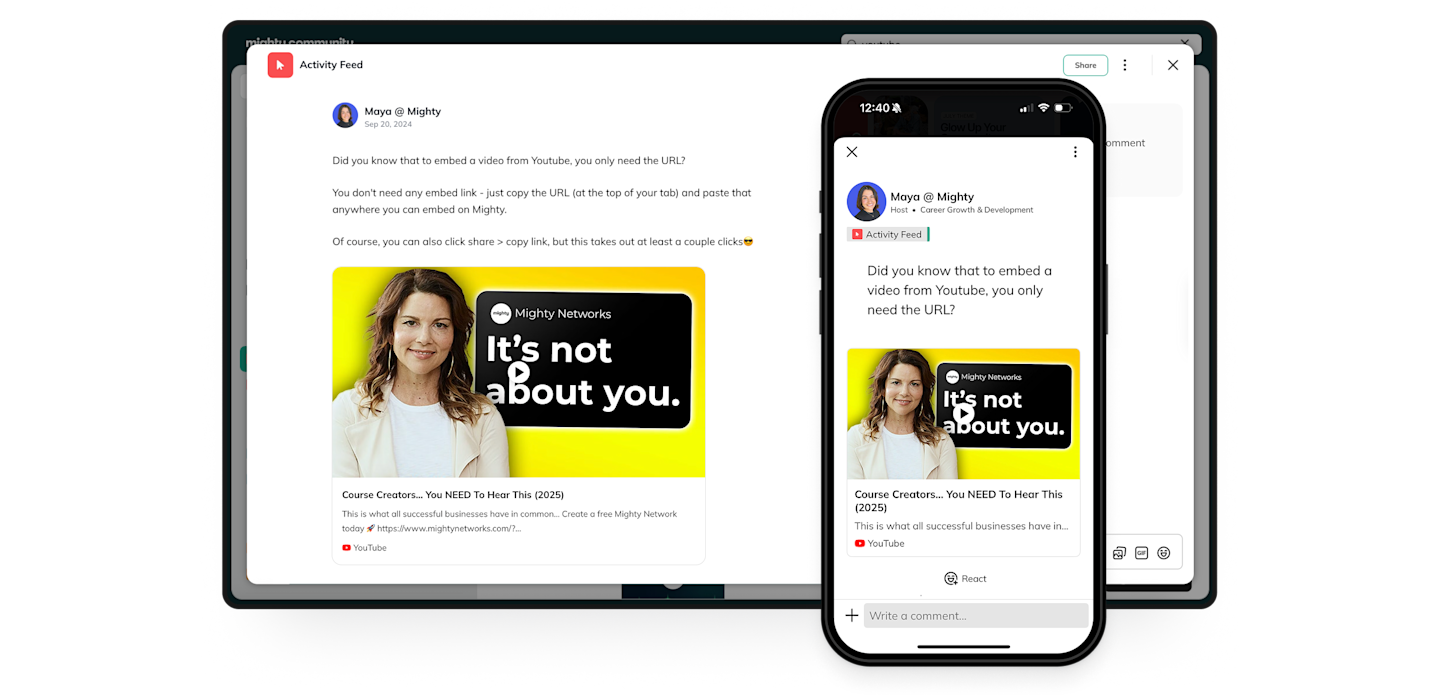
If you’re more interested in building a community and facilitating sessions with multiple clients at once, group coaching is the path for you. Group coaching can be just as effective or even more so than 1:1 coaching, especially if you have members who all share a similar set of challenges.
Benefits
It can foster radical honesty and vulnerability. When members open up about challenges they’re facing, it encourages others to do so.
It helps people know their struggles are normal.
Members help keep one another accountable--challenging members to take steps and asking how it went.
Serve more members at once.
Unlike 1:1 coaching, group coaching is much easier to scale, meaning you grow your business more quickly in less time.
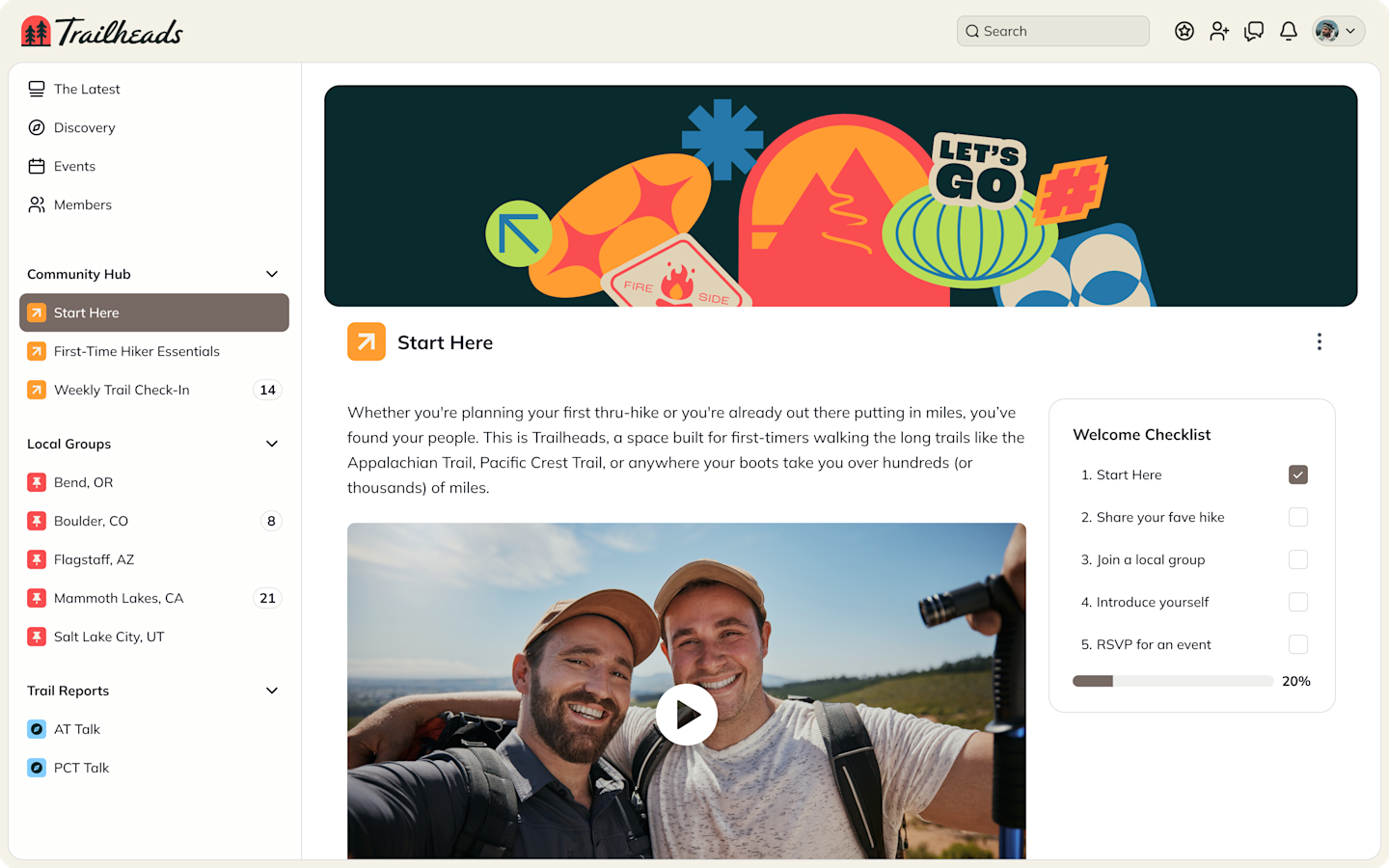
The challenge with group coaching is that you have less time with each client (sometimes you won’t get the full picture of their situation in the first few sessions).
Working with a group also requires a higher level of emotional intelligence (EQ) because you’re working with a variety of individuals who have different personalities and perspectives. You’ll have some clients who actively participate, and volunteer to share their point of view, while other clients are fine just observing and don’t always feel comfortable sharing.
That’s why it’s your job as a coach and the group facilitator to moderate discussions, make note of who participates, and pick clients who will make your coaching community thrive. Your ideal clients will be people with similar experiences, who are willing to talk about these experiences during a group coaching session where you provide a safe and non-judgemental environment.
You need to help everyone find common ground and make sure that each member achieves their goals by overcoming their personal challenges — which is no easy feat!
How to start an online coaching business (8 steps)
1. Find your unique value proposition
While coaching involves helping others, you can start from yourself.
Take stock of your core competencies and ask yourself important questions.
What do you do better than most people you know?
What area do you have lots of experience in?
What do people ask you about?
What have you learned that you could help someone with?
Do you need additional qualifications and certifications?
Do people pay for coaching in your area of expertise?
Maybe you’ve spent years working in a particular industry like Aliza Licht, who worked in fashion, creating popular social brand personalities. Now she uses her experience as a successful entrepreneur to provide career advice and new insights for young working professionals.
Basically, figuring out your focus as a coach involves knowing what areas of expertise you’re qualified to help others in combined with what you’re passionate about.
This leads us to who you want to coach…
2. Identify your ideal clients
As with any business, you want to hone in on who your ideal clients are. Since you have expertise in one area, it would be difficult to appeal to everyone.
That’s okay, because that’s the beauty of coaching — there’s a coach out there for every type of person.
Look at these examples of online coaching businesses:
Helping single dads get back in the dating game
Helping IT consultants get more contracts
Helping millennials who are first-time bosses transition to leaders
Helping CEOs craft their thought leadership on LinkedIn
They are all specific coaching businesses with a clear ideal client.
With a crystal clear ideal client, you'll better understand how you can help them, what they need from you, and how to attract new clients.
What does your ideal client look like? Be clear about what their pain points are, their experiences, what stage of life they’re at, and what they want to achieve. You want these people to see your services and think, “That’s what I need!”
How to validate your Ideal Client
Interview potential clients
The best market research is potential client interviews. Set up interviews with potential clients, say 15, to find out their pain points, goals, and learning styles.
Keep an open mind here and listen well. These interviews aren't just about finding ways to sell things to the people you think are ideal clients. It's also about validating both your niche and your idea.
If you get positive feedback and see a need, move forward.
Try pre-selling
The easiest way to validate an offer? Sell before you build! Call it a test. Call it a “painted door” (that’s a marketing term).
Rather than spending a ton of time building a program or course, try just selling it! It could be a live course. It could be in-person meetings. But the point is, sell it! Get a landing page up and start selling. It’s a great way to test.
And if it flops? Maybe you’ve got some more work to do.
Run a beta cohort
Some coaches opt to run a test cohort at a discount for 5-10 of these Ideal Members. Or, just use a small group to test, without this discount. This lets you assess what’s working and get feedback from real members.
3. Develop a coaching program
With your ideal client in your mind, it's time to design the program that will get them to transform.
Who will they be a year from now because they did your coaching program? What will they have accomplished? Set program goals, and then lay out clear steps to help them get to those goals.
Your coaching program needs to involve clear steps and structure.
Example: "Launch a tech career in 6 months"
Let’s say you’re a career coach who helps unfulfilled and underpaid employees transition into better careers in the tech industry over a six-month period. You've got a clear promise in your coaching package, plus a time-frame to help them reach their goals.
You'd need laser focus on what sessions your clients need to move the needle, and actionable items after each session to make sure they'll see results. It could look like this
Session 1: Networking and exploring paths
Session 2: Landing your first interview
Session 3: Acing the interview
Session 4: Salary negotiation and professional development
Community Design™ can help
When creating a Mighty Network, we teach a process we call Community Design™, and part of the process is developing a Big Purpose statement, which looks like this:
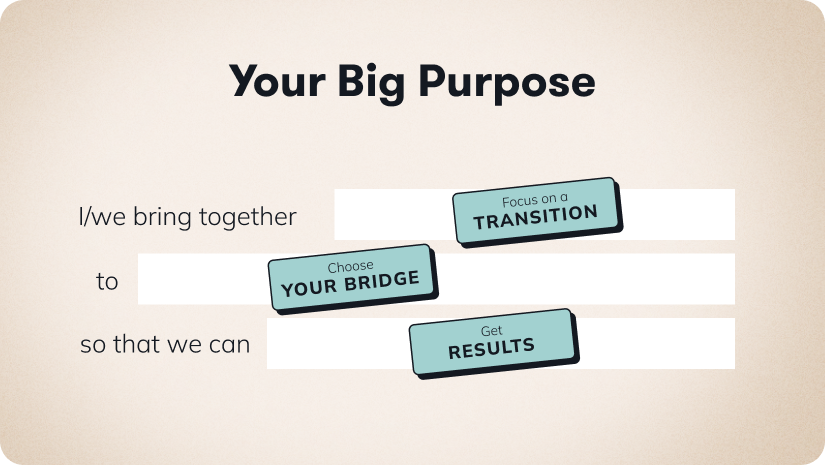
We do this for building communities, but whether you're building a coaching community or not--the steps are great to walk through.
A few more things to check
Are there any certification requirements in your niche or that you should have?
Do you have any necessary contracts or agreements? Often these can be found as templates online, but checking with a lawyer can be a good idea–especially if your coaching deals with sensitive material.
Do you need liability insurance? You can check with a lawyer here too.
What type of business structure will you run with? There are advantages and disadvantages to choosing an LLC vs. a sole proprietorship, or something else. Check with your local business center or online to find the best scenario for you and your jurisdiction. And make sure you’re in line with tax law!
4. Set the price
You could run a masterclass on setting pricing for coaching packages. But here's a simple hack.
Rookie coaches look at themselves to set their pricing. They ask:
How much am I worth?
How much do I know?
How much can I feel good about?
Veteran coaches look at the client. They ask:
How much is this knowledge and transformation worth to them?
How much value will they get out of this?
How much do they need to pay to take this seriously?
How much can they afford?
And do your research on what comparative packages go for. Ask other coaches in your niche or simply scour the Internet to find your answer.
A good rule of thumb is to price your services high enough that your clients will value your work but low enough that your ideal clients can afford you — find the sweet spot.
But this is a very different number--depending on your clients. Unemployed job seekers may value a coach, but can only afford to pay a certain amount. For an executive, that same amount is probably too small.
There may be some trial and error when it comes to figuring out your rate, but you’ll quickly know what makes sense and adjust accordingly.
Something else to keep in mind is that you should require a minimum commitment from your clients. Maybe you offer package deals but the minimum package is four coaching sessions. This will give you enough time to get to know them, help them with their challenges, and show them your value, keeping them coming back for more.
5. Choose a platform
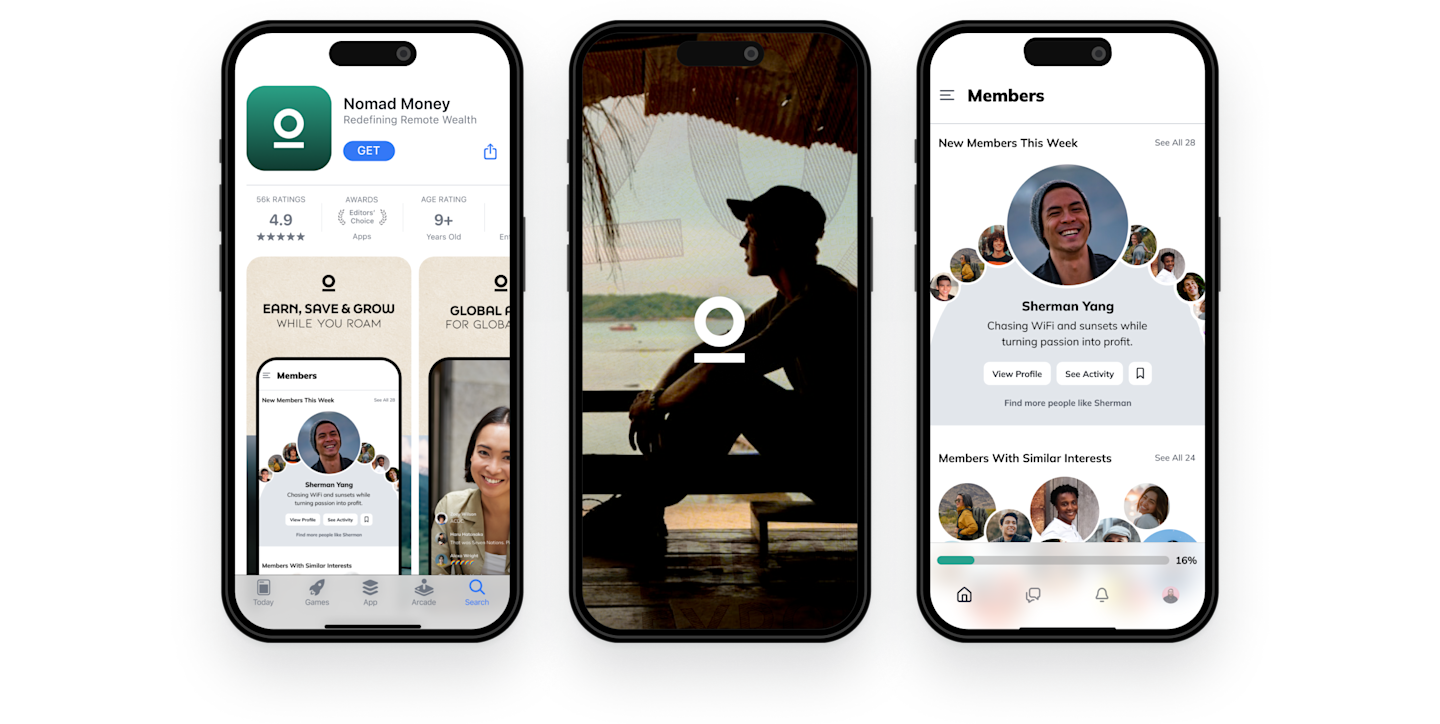
Delivering online coaching requires tech. There's no way around that. So pick a platform that makes sense for your online coaching business. Whether you want to do 1:1 coaching or build a community for group coaching, your platform should have all the features that make your online coaching business a success.
At the bare minimum you’ll need a platform where you can host scheduled video conference sessions. A good online coaching platform will also let you offer free trials, bundles, discounts, and anything else related to sales.
Even if you prioritize 1:1 coaching, consider building a community out of your interested clients. You might be surprised what connections emerge, and if you decide to pivot into group coaching, you’ll have a ready-made audience. Look for a community platform that’s designed to make engaging easy.
Features such as public forums for posting and live streaming, direct and group messaging, and video hosting will be essential to encourage interaction and connection amongst members.
Or, you could choose a platform to help you build beautiful, engaging courses. Courses are great additional resources for your clients or they can be tied right into your coaching program. They allow you to have more of an impact and can be used to scale your business (e.g. offering your courses separately from your program and charging an additional fee for members to access them).
6. Build and test
As with any business, you want to test it out before you launch it. Even if you have done in-person coaching, it’s a good idea to test out your online coaching business on a few clients. Make sure your internet connection is good, the transformative journey you take your clients on makes sense, and you’re familiar with the platform.
This is where you can iron out any kinks and get feedback. Testers who have benefited from your coaching services will be happy to provide a testimonial, which you can use for marketing purposes.
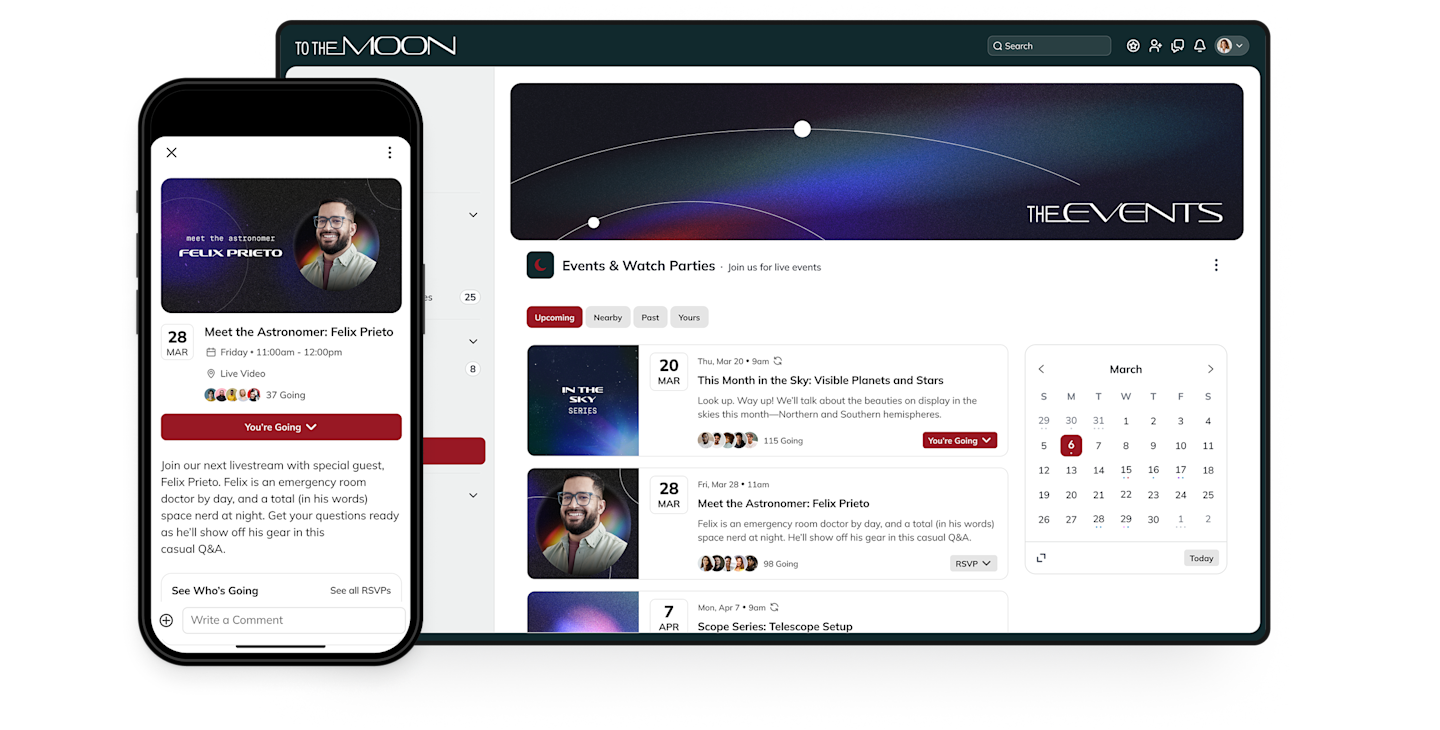
Bonus - Use AI & automations to save time
Don’t just create content or a course. Use tech to make your coaching and community management work easier. Here are some great hacks.
Automate scheduling and reminders. This can mean self-service booking, appointment changing, auto emails, and app notifications.
Automate intake and assessment. This can go with scheduling, but you can also use AI for analyzing intake data and setting up profiles.
Try AI content creation. You can use AI to draft notes before and after sessions, summarize sessions, build email sequences, outline courses, or draft marketing materials. (Make sure you understand how to collect and preserve this data safely. Here are some best practices for hosting on an AI community platform.)
Use smart community moderation. You can set up new member sequences, automated journeys and UX, and AI moderation tools for flagging content that violates community guidelines.
Use AI engagement tools. Some platforms have AI engagement tools built in to boost profile creation, instantly introduce members to each other, spark discussion questions, and gamify member experiences. These can boost completion rates in communities.
7. Build your pipeline
Just like any business, most coaches need to spend some time attracting ideal clients. What’s important here is to stand out from the sea of other coaches. Remember to highlight what makes you unique by accurately describing your services and showcasing your strengths, credentials, and experience. And lead with your story... that's powerful.
Here are some marketing strategies you can implement to attract new clients:
Use social media: Choose social channels that make sense for your business and where your ideal client is likely to hang out the most (e.g. Facebook, Twitter, LinkedIn, Instagram, even TikTok depending on the type of content and age of the target audience). Make sure to engage with content as well, don’t just post and expect others to like your stuff. But there's a lot of noise on social. Don't be surprised if you don't get an explosion of clients just from posting regularly.
Consider ads: Although not free (and sometimes not cheap), ads might make sense for your business. It’s a good way to get in front of a new audience and may generate a high return on investment (ROI) for you.
Integrate email: Email marketing can be a solid client acquisition strategy--since 99% of email users check their inbox daily. So give value in people's inbox. For example, if you’re a nutrition coach, you can provide five examples of healthy snacks to prepare on the fly. Each week you can provide a new tip with a call to action (CTA) to sign up for your coaching program.
Create more value: A common marketing strategy is to create additional resources, like an ebook or infographic. This strategy is to establish yourself as an expert and show that you're capable of offering value.
Use testimonials: They're powerful. to back up your claims and prove your legitimacy. 70% of any shoppers online read reviews first. That's why testimonials can be a really valuable selling tool.
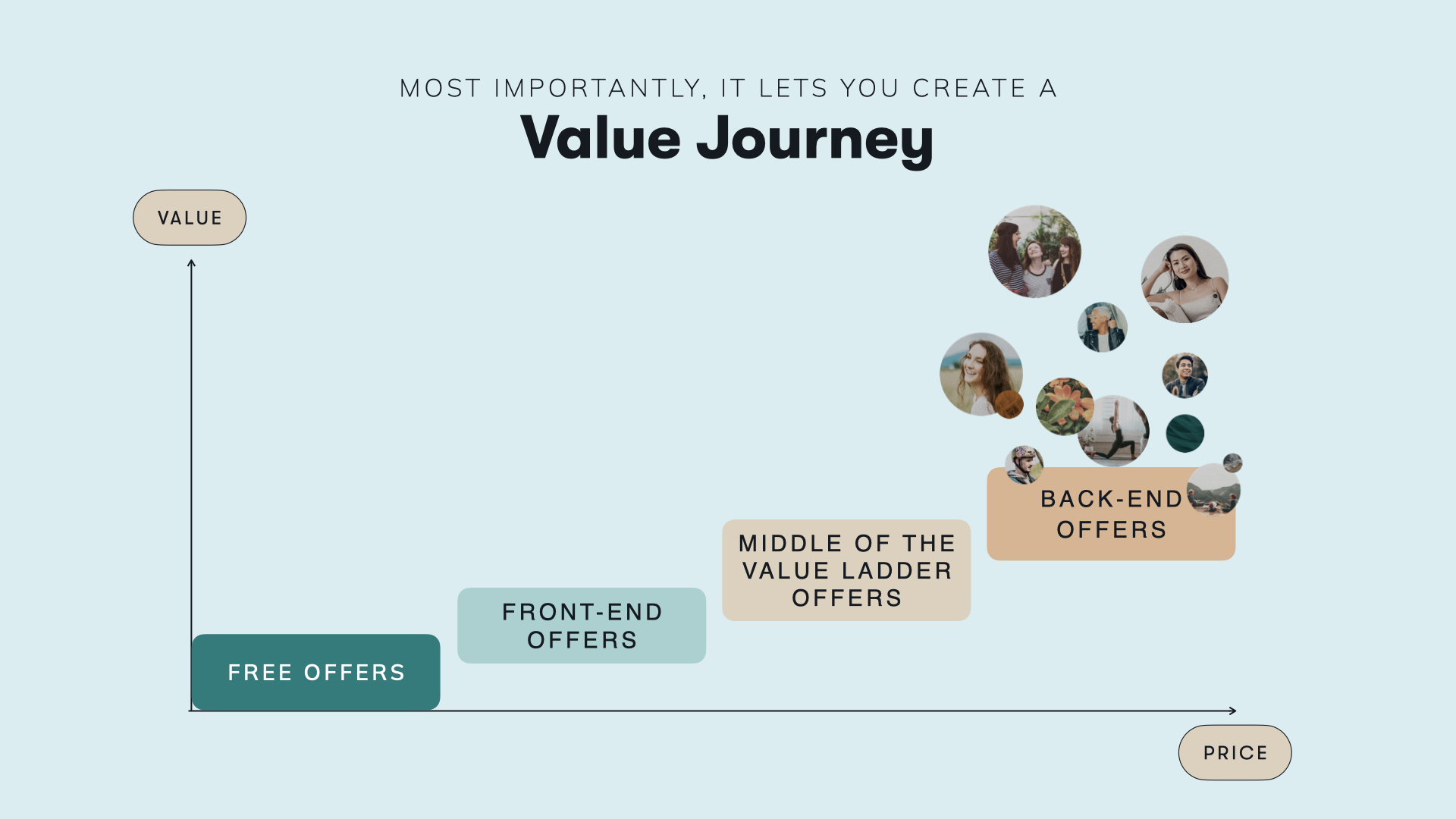
8. Deliver (And keep delivering)
Finally, deliver your coaching package to the very best of your ability to your ideal clients. And when it's done, look at what worked and what didn't, then run it again.
Thanks to online marketing, many coaches have the idea that they need to make $20k in their opening weekend to be a success. That's not true at all. Keep growing, learning, and improving. Thriving digital businesses take time to grow, just like bricks and mortar ones.
Here are ways to improve:
Check in with your clients to see if they reached their goals.
Ask for feedback (as well as testimonials).
Check your analytics to see what worked and where clients spent time (especially with a recorded coaching program).
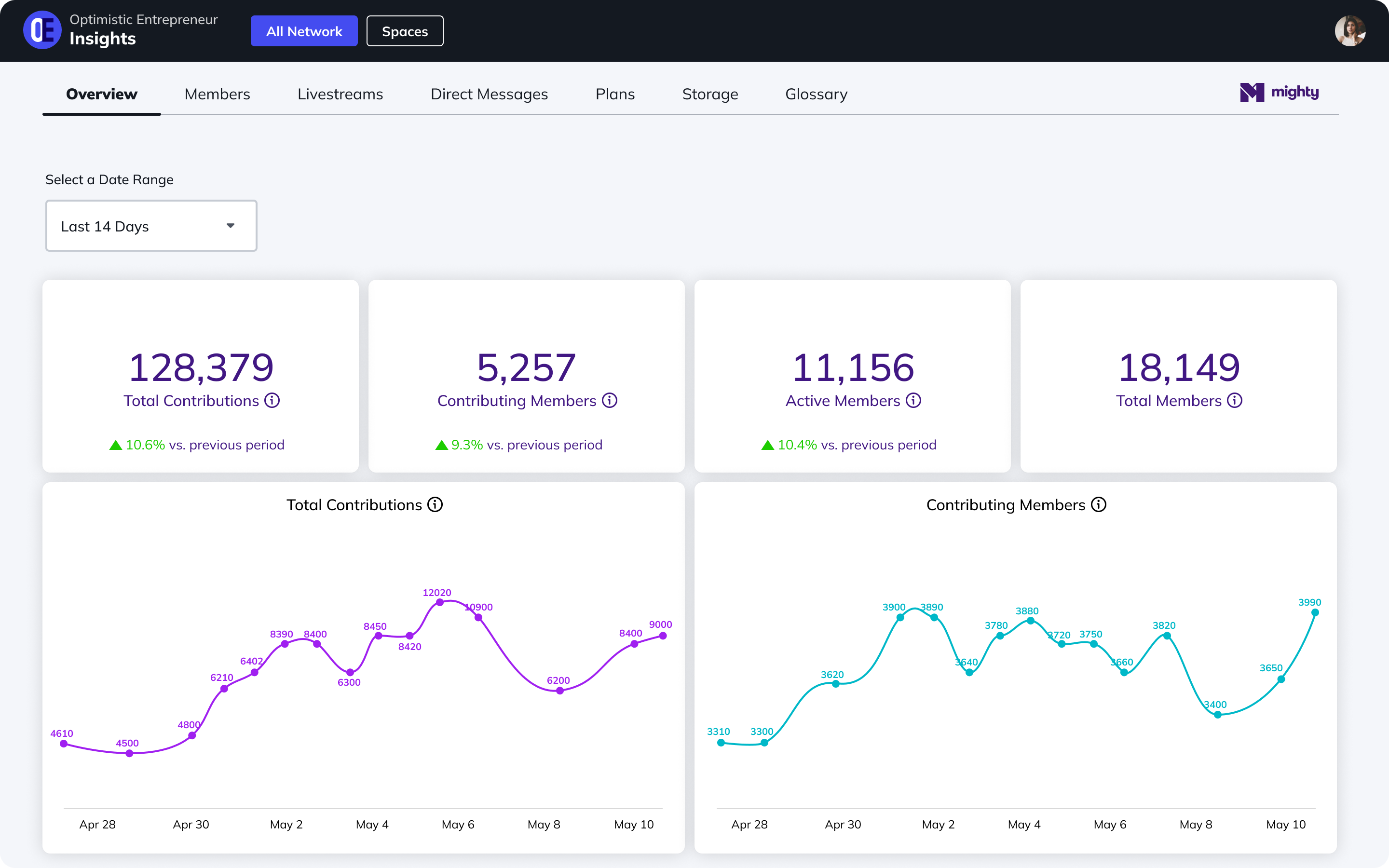
The importance of community for a coaching business
We see a lot of coaches choosing to mix coaching programs with a thriving virtual community. And it makes sense.
Community adds a wrap-around layer of trust and friendship that amplifies coaching results with accountability, inspiration, and, if it fits, gamified learning. Members can see people on the same journey as them as they share stories and wins.
Community also gives more leverage for a coach, since you can serve people at scale: creating content for many people at once, hosting a group conversation, or running a virtual event.
You’ll make more money! That’s because you can sell memberships, events, or premium offers right from your community platform.
Client retention and attraction gets easier. As you build a thriving community, word-of-mouth growth jumps.
It gets easier to wow clients. That’s because you can create your own branded platform with great UX that feels professional. This community platform becomes your secret weapon!
Conclusion
Whether you prefer coaching 1:1 or in a group, there’s a lot that goes into building an online coaching business. If you thoughtfully plan it out, from understanding who your ideal clients are to attracting the right ones, you’ll have a successful business that you can run from anywhere.
If you're looking for coaching software that gives you everything you need for your online coaching business: including the power to build programs, deliver sessions, host virtual events and livestream, and build a coaching community (if you want to), come build with Mighty!
Our powerful platform is designed to help you grow your online coaching business and community. And you can try it free for 14 days--no credit card required.
FAQs
1. Is online coaching profitable?
Yes, the most recent coaching data from the ICF suggests coaches earn an average of $52,800 USD. ZipRecruiter reports that the average coaching salary on their platform is $18/hr, this is roughly the same as the ICF data. Now, of course, there are online coaches earning multi-six figures from high-ticket offers. So we know that there are coaches making a lot more than $52,800. But there are also many coaches making less.
Is this profitable?
Well, if you’re earning this at home, with no overhead, it might be happily profitable. It really depends how much you want to earn and what you need to live on. And group coaching can often scale and earn more than 1:1 coaching alone.
But overall, coaching is a flexible, well-paying career that fits a lot of lifestyles.
2. Which platforms combine scheduling, video calls, payment processing, and community in one place?
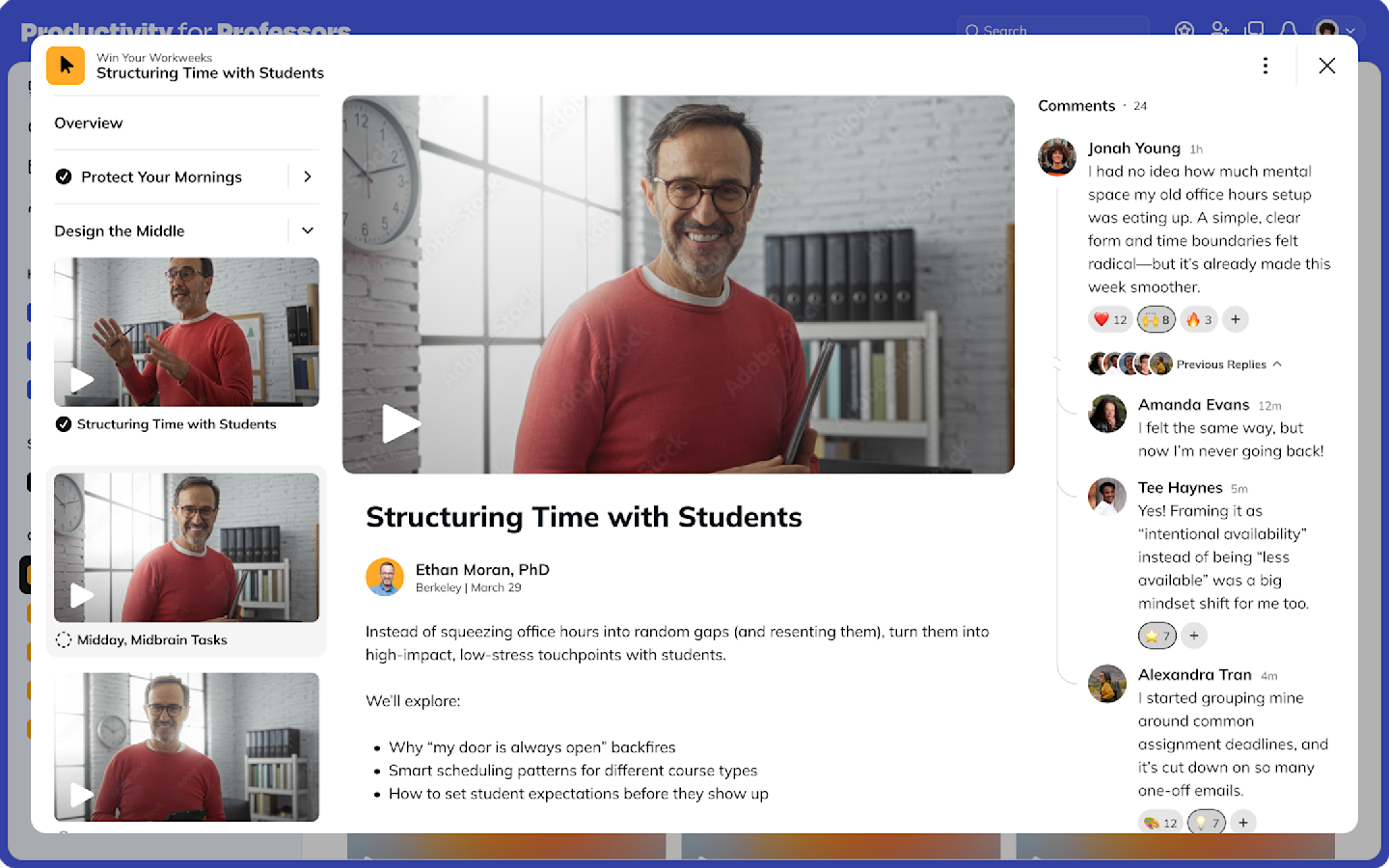
Mighty Networks is G2’s top-rated community platform. It has built-in event scheduling with RSVPs, flexible Spaces for building courses and community together, livestreams with high-velocity chat, and the ability to build plans and bundles in 135 currencies. And Mighty is designed for engagement, with AI-boosted creation, member profiles, automations, and 1-click introductions.
There’s nothing else like this.
3. How can I attract clients if I have no existing audience or email list?
While it might seem that every successful coach has a massive social following, that just isn’t the case. Those are just the most visible ones.
Many (even most) coaches build a business the old fashioned way, serving 1 person at a time and helping them transform. You need 1 person in transition, with a clear problem that you can address. Then you need to solve it again and again. It could be 1:1, but after a while, consider moving to group and community options to help people at scale.
To begin, here are some great ways to attract clients that don’t involve a huge audience:
If you did the “Ideal Member” research (above), let those people know you’re launching a program.
Post on your socials. Even if they’re small, you only need a few clients to get started!
Tell everyone! Friends, family, strangers. Don’t be afraid to own what you want to do.
Post on coaching sites or local pages.
Join networking groups or attend conferences and events where your Ideal Members hang out.
Often, the first few members are the hardest. As you grow, the work will snowball. Keep going!
4. Do I need business insurance or special contracts to protect myself and my clients?
While it’s not always legally required, solid insurance and contracts can buy valuable peace of mind to protect yourself from claims of negligence that can hurt your business.
5. What tools help me manage time-zone differences and automate session reminders?
Most coaching platforms or scheduling tools can do this. On Mighty, members see events in their local timezones, can add them to a Google Calendar, and get notifications by email and/or apps when the event starts. Similarly, calendar tools like Calendly or Acuity can be set to do the same things, including email reminders. You can check these features in the back end of your software.
6. How do I scale from a fully booked 1:1 roster to leveraged group programs without losing quality?
Scale usually comes from figuring out how you can give transformation to more people with the same amount of hours.
To begin with, this might mean streamlining your 1:1 business. For example, these are things you could implement to give you more hours to focus on clients:
Automated scheduling, billing, and reminders
Automated intake and forms
Hiring out clerical or marketing work
Using AI for meeting notes or written materials
But at some point, you need to scale the transformation itself for more people. Here are ways to do this:
Test offering some or all of the sessions in a group setting instead of a 1:1.
Record elements of your program as courses for members to complete on their own.
Host live or virtual events to bring people together for joint transformation.
Pair members up for peer-support or discussion sessions.
Host regular group discussions, AMAs, or livestreams on a community platform.
It’s surprising, but often coaches find their programs can be more effective by mixing in some of these elements. But, of course, make sure you keep checking in with members and looking at your analytics to make sure people are still getting the transformation they are paying for.
7. What metrics should I track weekly to know my coaching business is healthy?
Here are some great things to watch.
Revenue. Is the business making money? How much is a member “worth” in real dollars?
Pipeline. It’s easy to serve existing members and forget that you need to find new ones. Tracking your leads, discovery calls, and conversion rates is important.
Engagement. Are members showing up? Doing the work? Your platform should help you see how often members log on, where they spend time, and how much they’re engaging.
Churn. How often do you lose members? What percentage of your membership churns each month? Some turnover is okay, but too much is a sign your coaching business is struggling to help people make the transformation they want.
Satisfaction. Do members say they’re happy? You can incorporate things like surveys, polls, and even interviews to assess if they’re getting the results they want.
8. Should I sell digital resources—like workbooks or mini-courses—alongside live coaching sessions?
It depends. If there’s a good fit and a chance to add value to a member, then maybe consider it. But if you do sell digital resources alongside, make sure it doesn’t undermine your main offer. You can also consider giving these things away as bonus material or unlocks if you gamify your program.
9. How do I collect and showcase testimonials to build trust with prospects?
It can be hard to ask clients for testimonials. But here are a few great ways to get them.
Set up an automated ask. Set an email or reminder post to be automatically sent at some point for every member (e.g. when they finish a program). Give a link to where they can add feedback and ask! You can even make it recurring to prompt them.
Ask in person. In your last session, say something like, “If you’ve appreciated this program, please consider leaving a review. It helps me reach new clients and build trust.” Often this can work wonders!
Make sure to ask for feedback immediately! Months later isn’t the right time. Ask when a member is at a high point and the program is fresh in their mind.
Make it easy! The less friction you have, the less likely people are to click away.
Ask for permission to share great stories publicly, perhaps with a picture and testimonial (if this fits your brand).
Share success stories often! This can be specific (with permission), or even general and anonymous. But do share.
Seek video testimonials. These are powerful. Even a 10 second smart phone video can be better than a lot of written testimonials.
Ready to start building your community?
Start a free 14-day trial to explore Mighty—no credit card required.
More like this
Join Mighty Community
Learn the principles of Community Design™ (and see them in action) alongside thousands of creators and entrepreneurs. It's free to join!

Online Courses
Creating a Course
Teaching a Course
Course Platforms
Selling a Course
Communities & Memberships
Community Platforms
Managing a Community
Building a Community
Growing a Community
Monetizing a Community
Creators & Entrepreneurs
Monetization
Content Creation
Starting a Business
Website Builders
Creating & Managing a Website
Events
Event Platforms
Hosting & Marketing Events
Branded Apps
Creating a Mobile App
Coaching Apps
Community Apps
Coaching
Mastermind Groups
Starting a Coaching Business
Coaching Platforms
Filter by Category
Online Courses
Communities & Memberships
Creators & Entrepreneurs
Events
Branded Apps
Coaching
Start your free trial
14 Days. No Credit Card Required.














